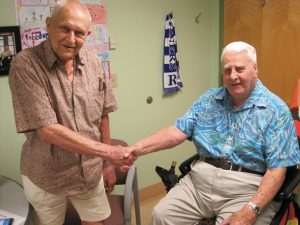Atomic bomb survivor makes game-changing donation
By Lookout on Aug 31, 2015 with Comments 1

So far, Second World War veteran Rudi Hoenson has given away $4 million of his fortune, but says his latest donation may be his most meaningful.
Earlier this month the 92-year-old Victoria philanthropist, and atomic bomb survivor, announced he would match donations of up to $200,000 to help cover the costs of new overhead lifts in all the rooms at The Lodge at Broadmead.
The Lodge at Broadmead is a 229-bed residential care facility with 115 priority access beds for veterans, 110 beds for seniors in the community, and four respite care beds for veterans.
The Lodge is the primary priority access bed facility for veterans on Vancouver Island.
“This is a complete game-changer and is also critically important for care at The Lodge at Broadmead,” said Jennifer Jasechko, Broadmead Care’s Fund Development Consultant.
“Residents will be able to get out of bed more often and easily, so it’s much faster, more dignified, comfortable, and also saves injuries to our staff.”
Previously, Jasechko says residents had been forced to wait for caregivers to arrive with portable lift units and then move them into wheelchairs or commodes.
The new lifts cost $5,300 each and will make life “considerably easier” for both residents and care-givers.
“I am veteran myself so I feel quite an association with the people here at the Lodge at Broadmead because I know what many of them went through,” said Hoenson.
“Many people who live here are war veterans or fought in World War Two as I did. I think it’s a good place to give back some money and make their lives here better.”
Hoenson was just 1.9 kilometres away from ground zero when the second atomic bomb ever used in warfare was dropped on Nagasaki, Japan.
Surviving that experience, he says, gave him a “greater understanding” of humanity and also helped him gain insight into the value of helping others.
Until recently he refused to speak a word about that infamous day, but after suffering a stroke in January, he decided it was time to speak up.
—
Here is his story:
On December 9, 1941, just two days after the Japanese attacked Pearl Harbor, Hoenson was enlisted to fight for Netherlands forces in the Dutch East Indies (now Indonesia).
But the Dutch were quickly overpowered by Japanese forces and when the order was given to surrender on March 8, 1942, Hoenson and the rest of his unit became prisoners of war.
After spending three months at Changi Prison in Singapore, Hoenson was eventually shipped to a POW camp in Nagasaki where he would spend the remainder of the war living under what he describes as “brutal” conditions.
On Aug. 9, 1945, the United States dropped its plutonium-type bomb named Fat Man. The explosion and firestorm that enveloped the city killed an estimated 50,000 people, creating what Hoenson describes as a real-life “hell-on-earth”.
“At 11:02 we prisoners witnessed the most unbelievable explosion,” Hoenson recalls.
“I was outside in the open and the hot blast knocked me over….Everything was like kindling and it all started to burn. Through the smoke we saw the great mushroom column [cloud] and wondered what kind of explosion or bomb had caused this immense fire and destruction.”
Despite suffering radiation sickness from the blast, Hoenson survived the nightmare. The Japanese surrendered to the allies six days later.
He says moving to Calgary in 1951 and meeting his wife Sylvia Mae – who he wed in 1956 – helped him come to grips with the events in Nagasaki.
Rudi and Sylvia would never have any children though, a painful decision Hoenson says he still “struggles” with today. Hoenson feared the radiation his body absorbed would have led to deformations in any children he fathered.
Since there were no children to care for, Hoenson invested his money on a small portfolio of oil patch stocks, initially valued at $40,000.
By the time he and Sylvia moved to Victoria in 1979, in the midst of the energy crisis, the value of the shares he owned began to grow exponentially.
“I said to myself, ‘what am I going to do with my money?’
I have to spend it somehow and we both agreed that this was best,” he said.
In their retirement years the Hoensons travelled the world and decided to start giving small amounts of their fortune to charity.
After Sylvia’s death in 2008, Hoenson said he began making larger donations.
Those included a $1 million donation to the Victoria Hospitals Foundation; $400,000 each for the B.C. Children’s Hospital and the Saanich Peninsula Hospital, and a $350,0000 donation to the B.C. Cancer Foundation.
Prior to his latest work of philanthropy, Hoenson has made close to $400,000 in donations to Broadmead Care.
One Lodge resident who will benefit greatly from Hoenson’s latest gift is Maurice Hundleby. Hundleby, 92, was stationed in Hoenson’s home country of Holland with the Canadian Armed Forces during the Second World War.
“It [the lift] will help me quite a bit,” said Hundleby. “Things like being able to get out of bed and move freely when I want to may seem like little things to some people, but to me they are huge.”
For more information on the Lodge at Broadmead visit www.broadmeadcare.com.
Peter Mallett
Staff Writer
Filed Under: Top Stories
About the Author:






After the Netherlands had waited 71 (!!!) years for payment of salary for the period 1942 to 1945, Mr. Roensoen donated this 25,000 euros to war veterans in Victoria, Canada.
The Dutch government won’t pay the heirs and husbands, they waited 71 years until most veterans were deceased, it is a shame!
Congratulations for Mr. Roensoen, he did the right thing!